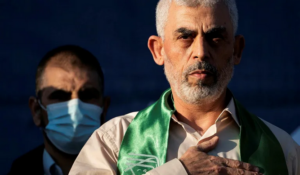What Hamas chief Sinwar’s secret communications show about his thinking

Yahya Sinwar, Hamas leader in the Gaza Strip, places his hand over his heart at a rally of supporters, May 2021, in Gaza City
Ronit Marzan writes in Haaretz on 17 June 2024:
Yahya Sinwar’s secret correspondence with Hamas’ external leadership, which The Wall Street Journal revealed last week, provides a window into his thinking.
“Things went out of control. People got caught up in this, and that should not have happened,” he wrote. He understood that Hamas’ operational achievements on October 7 were overcome by the cruelty of the Gazan masses and the fighters of Hamas and the other factions, and by Israel’s ground operation, which he did not expect.
For years, Sinwar became used to Israelis rejecting a ground operation in Gaza because of the cost in soldiers’ lives and in governing the two million Palestinians living there. He thought that an attack on IDF bases and killing and abducting soldiers would result in a military round and pressure Israel to move forward on a deal for the release of prisoners in exchange for the hostages. He was wrong.
Israel decided on a ground campaign in Gaza on October 28, and to preserve the operational achievements and prevent Israel from destroying the tunnels and military infrastructure, Sinwar quickly offered a deal at the start of the campaign: release all hostages in exchange for the release of all Palestinian prisoners.
The Sinwar brothers, who in their childhood hid in pits their father dug to protect them in the 1967 war, struggled to forego their life’s work. In November, in order to improve their position in global opinion and bring about a quick end to the war and protect Hamas’ military power, as well as making it clear to the organization’s external leadership, which had begun to distance itself from him, that its control center was in Gaza, not Doha, he agreed to release 105 hostages for 210 Palestinian prisoners.
Sinwar understood that he could not defeat Israel on the battlefield, but could on the civilian field. He booby-trapped population centers, concealed his fighters among Gaza’s residents, and took care for civilians to hold the Israeli hostages in order to draw Israel into killing civilians, which would increase international anger and sanctions on Israel, causing it to withdraw from Gaza. In one message, Sinwar cited civilian losses in national liberation conflicts in places such as Algeria, where hundreds of thousands of people died fighting for independence from France. “These are necessary sacrifices,” he said.
Sinwar realizes that without popular support, he and the Hamas leadership in Gaza cannot be part of post-war arrangements, and he could lose his life like Gadhafi or Mubarak in the Arab Spring. He therefore linked the Palestinian victims to the Algerians, whom the Palestinians learn about, and the concept of martyrdom bringing glory to the Arab nation.
“As long as fighters are still standing, and we have not lost the war,” he wrote in anger, after learning about contacts by the Hamas external leadership with Fatah officials, “Such contacts should be immediately terminated. We have the capabilities to continue fighting for months.”
There is bad blood between Sinwar and Khaled Meshal, who is responsible for Hamas’ foreign policy. In the internal elections for Hamas institutions in 2021, Meshal tried to remove Sinwar from the head of the political bureau in Gaza and replace him with Nizar Awadallah, but the attempt failed when the Izz al-Din al-Qassam Brigades intervened. At the end of Operation Breaking Dawn in 2022, in which Sinwar did not join the Islamic Jihad in the campaign against Israel, Al-Araby Al-Jadeed reported that the Qatar media, founded by Meshal adviser Azmi Bishara, printed a humiliating caricature depicting Sinwar as a collaborator with Israel. Sinwar’s activism angered Meshal, and he made sure to belittle him at every opportunity and make it clear that Hamas decisions are taken by the leadership institutions and not by any one man.
“We have to move forward on the same path we started, or let it be a new Karbala,” Sinwar wrote. He realizes that the Iranians will not shed blood to save Sunnis, hence his reference to the battle of Karbala – an important battle in the development of Shia Islam, in which the Prophet Mohammed’s grandson, Husayn, was defeated by the Umayyad Caliph, Yazid I. This was his message to Iran: A Hamas defeat would mean an Iranian defeat.
It is possible that Sinwar remembered Yasser Arafat’s use of the battle of Karbala and wanted to send a message to the Arab leaders that any attempt to build a Palestinian governing entity without Hamas in Gaza would result in civil war. Arafat needed Karbala to glorify the Palestinians’ fight against the Jordanian army (1970-1971) and against the Israeli army in besieged Beirut (1982).
Arafat also wanted to warn King Hussein, a relative of Husayn, the prophet’s grandson, not to follow the path of the Umayyad Caliphate and widen the schism in the Muslim world, obtain support of the Lebanese Shias and hasten the descent into civil war. It seems that only when Sinwar realizes that no one is courting him and there is a governing alternative to him, will he move forward on a deal.
Ronit Marzan is a researcher of Palestinian society and politics at the Chaikin Chair for Geostrategy at Haifa University .
This article is reproduced in its entirety
